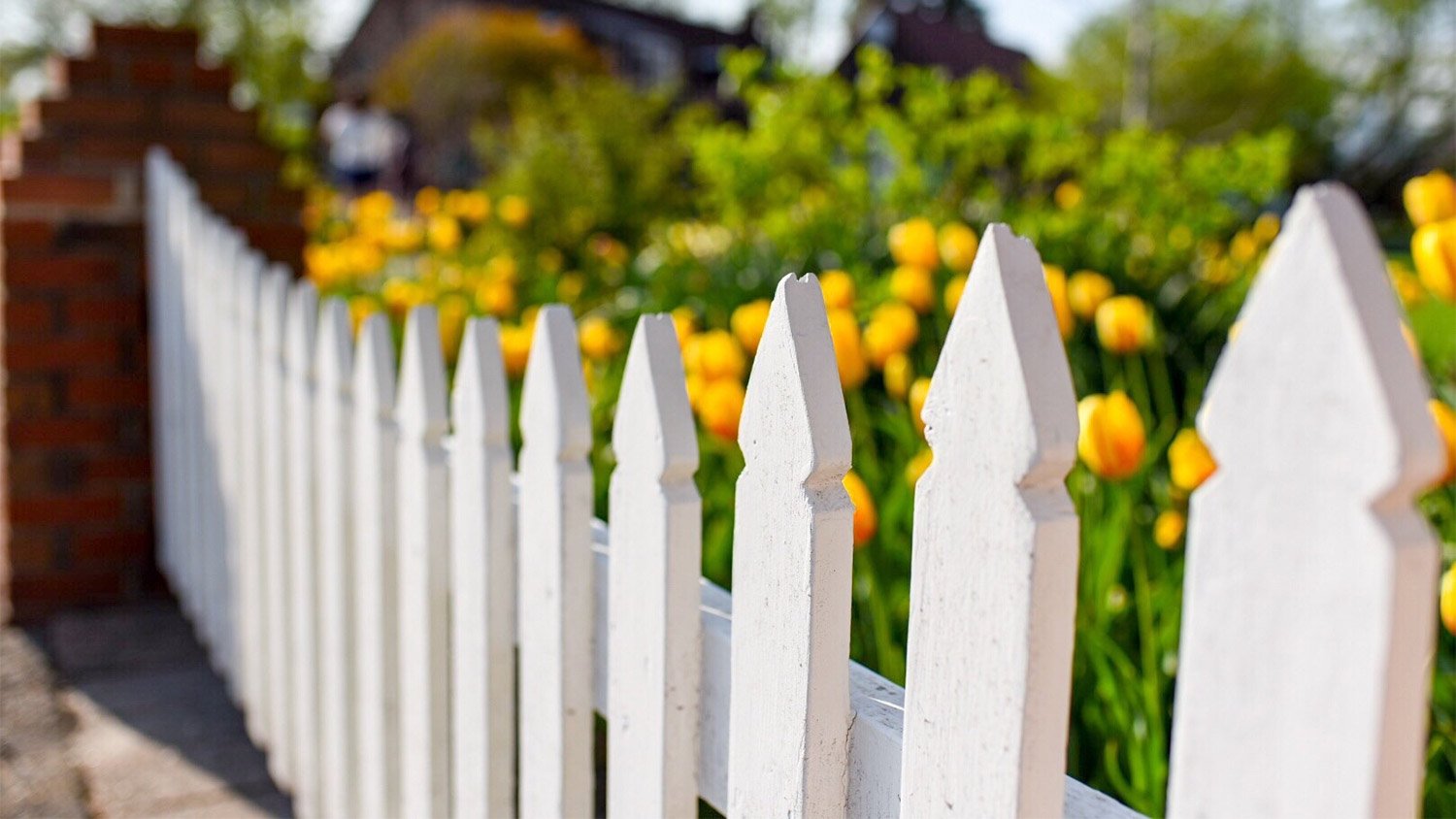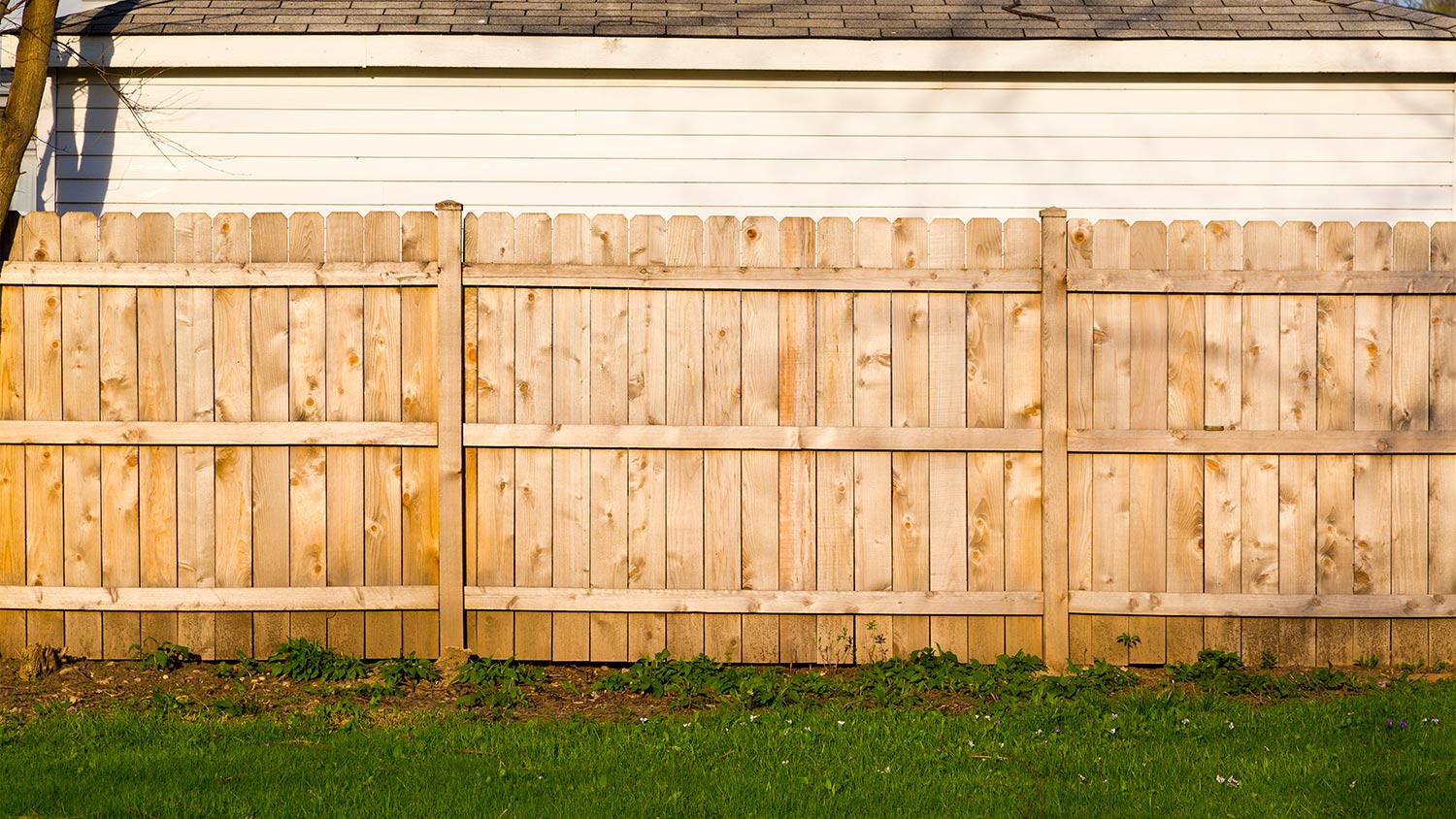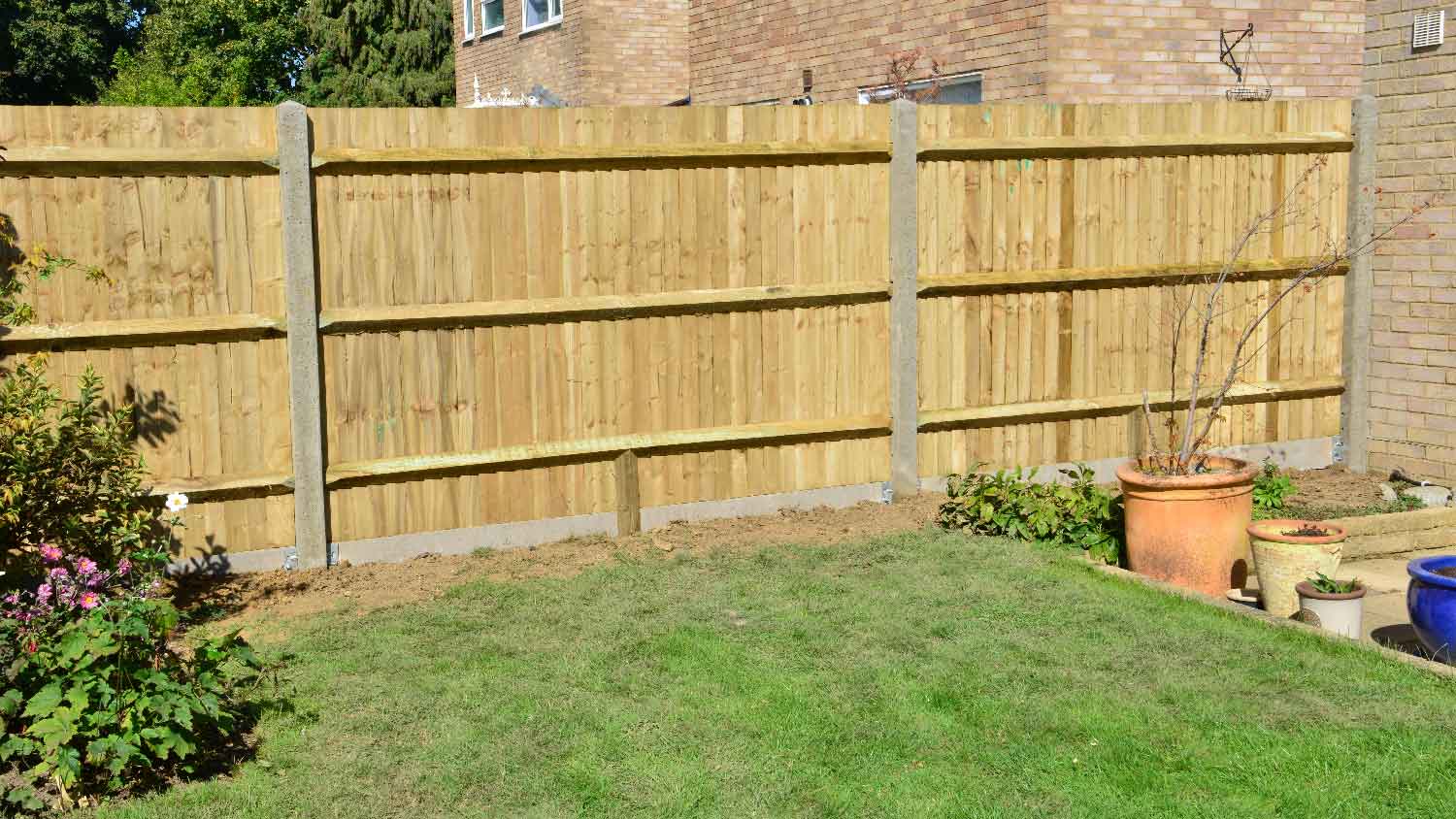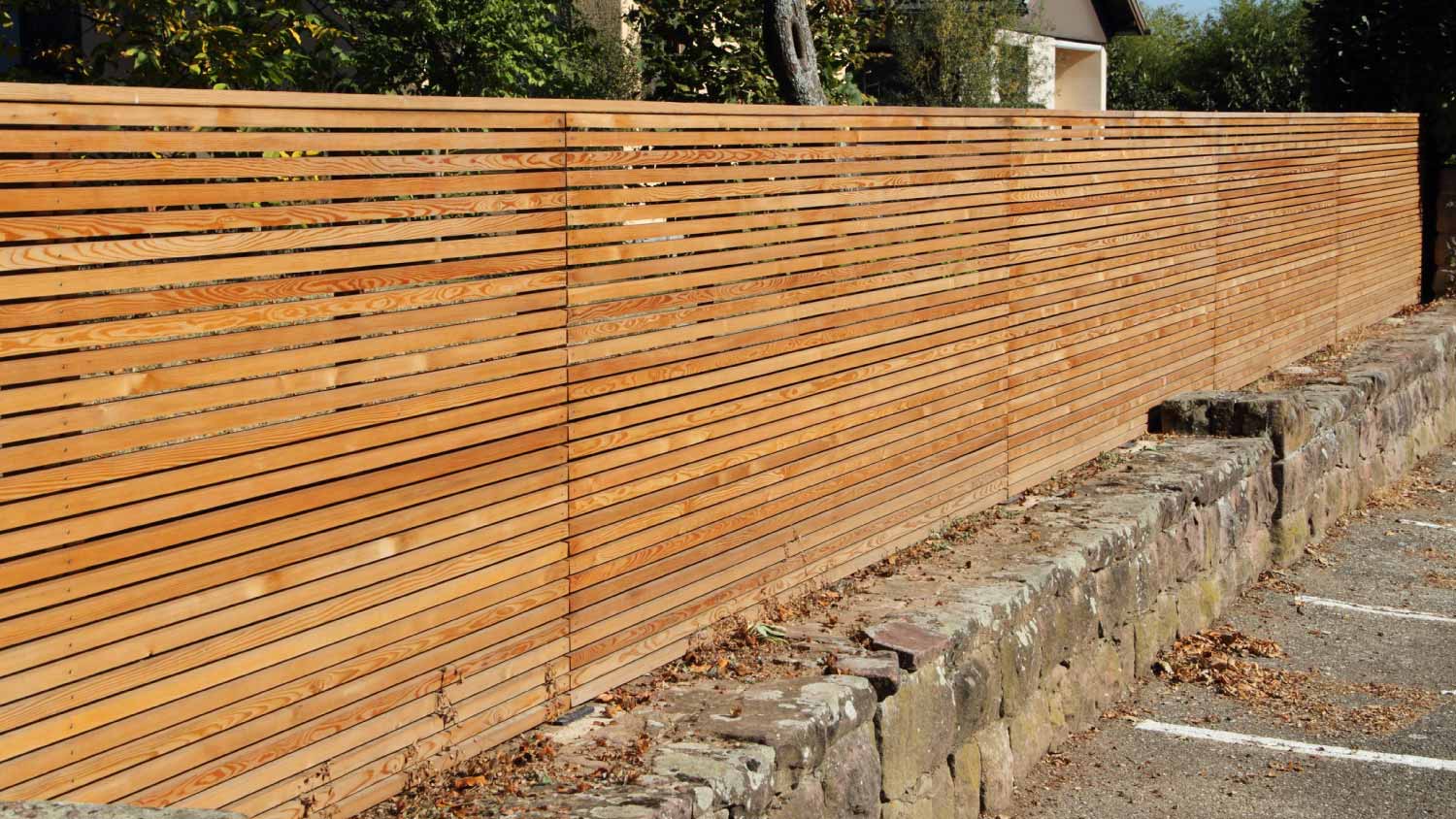10 Types of Wood Fences and Pros and Cons of Each One
Swing for the fences and choose the best style of pickets and posts


The type of wood fencing you choose for your yard does more than just section off your property. The best type of fence for your home enhances your privacy, cuts down on noise, and offers a place to grow climbing plants along the edges of your yard. Wood fences are a popular choice for homeowners looking to blend their natural style with enough strength and durability to fight the elements. Explore these 14 common types of wood fences, from the fencing style to wood varieties.
1. Split-Rail Fence

This ranch-style fence is the type you'd imagine on a farm 200 years ago. The term split-rail comes from splitting logs lengthwise either into two or four long pieces. In this design, just one, two, or three rails connect individual posts several feet apart. The cost of a split-rail fence is $10 to $28 per linear foot, but you can save over $1,000 on labor if you have the skills and time to build it yourself.
| Pros | Cons |
|---|---|
| Nice rustic aesthetic | Not good for containing pets and children |
| Generally affordable type of fence | Not a good source of privacy |
| Easy to DIY install | Not a good option for home security |
| Durable and low-maintenance |
Split-rail fences are best for:
Simple, rustic style
Marking property
Enclosing fields with large livestock
2. Picket Fence

We all know the picket fence from the images of 1950s suburban dream homes. They are often lower than privacy fences, sitting just three to four feet off the ground. Picket fences offer a welcoming vibe while still fencing in the dog. The cost to install a picket fence runs between $10 and $75 per linear foot depending on the type of wood and whether you add gates and high-end hardware.
| Pros | Cons |
|---|---|
| Attractive design with mass curb appeal | Not a good source of privacy |
| Customizable, with several material types and colors | Requires more maintenance, such as cleaning, staining, and painting |
| Generally made with durable materials that last a long time | Not ideal for super small pets who can slip through pickets |
| Offers moderate source of security |
Picket fences are best for:
Fencing in a property without cutting off yard views
Planting fence gardens
Increasing home curb appeal
3. Lattice Fence

The delicate criss-cross pattern of a lattice fence finds that tricky balance between style and privacy. Choose from either full panels of lattice or lattice accents at the top of the gates of your fence. Keep in mind that lattice fencing is often much thinner than other types of posts and rails, making this an ideal option for surrounding vegetable gardens or adding to the top of a sturdier style as an accent. Lattice panels cost just $2 to $6 per linear foot for materials plus $30 to $50 an hour to hire a local fencing contractor.
| Pros | Cons |
|---|---|
| Beautiful aesthetic, especially when used with vining plants and in garden spaces | Not as durable as other types of wood fences |
| Affordable fencing solution | Not a great source of privacy (similar to a chain link fence) |
| Easy to install |
Lattice fences are best for:
Flower and vegetable gardens
Deterring local wildlife
Adding minimal privacy to your yard
4. Board-on-Board Fence

The remaining types of wood fences on our list get into privacy fence territory. Starting with one of the most air-tight fence styles, board-on-board fences layer each picket so that it overlaps with its neighbor.
The board alternates the side where it overlaps, creating a patchwork appearance that doesn't allow any light through either side of the fence. It also looks attractive on both sides, making it ideal for front yards and when you want to make a good impression on your neighbor. Since you need more materials to create the look, board-on-board fences cost $15 to $52 per linear foot including labor.
| Pros | Cons |
|---|---|
| Ultimate source of privacy | Higher material costs (more materials required) |
| Great option for yard security | Not suited for DIY install |
| Ideal for containing pets (including large dogs) and children) | Requires regular maintenance, such as staining and painting |
| Durable and long-lasting |
Board-on-board fences are best for:
Complete privacy
Poolscapes
Wind- and storm-prone areas
5. Shadowbox Fence

While very similar to the board-on-board fence style, shadow box wood fences include a slight gap between the alternating pickets. They offer complete privacy when viewed straight on, but offer a bit of a view from an angle. Shadowbox fences offer a nice balance between constructing a wall of wood and letting in enough light to plant shrubs on the edge of the perimeter. Shadowbox fences can be difficult to install precisely, so you'll need to hire a professional. Though the cost of shadow box fences can vary, expect to pay between $17 and $40 per linear foot between materials and labor.
| Pros | Cons |
|---|---|
| Better aesthetics than most other types of privacy fences | Not a complete source of privacy |
| Good source of security | Expensive to install |
| Great for containing pets and children of all sizes | Challenging to maintain |
| Made with durable materials |
Shadowbox fences are best for:
A balance of light and privacy
Durability against rough weather
Curb appeal on all sides of the fence
6. Louvered Fence

A louvered fence adds a touch of subtle modern style to your lawn. The louvered pattern places either vertical or horizontal pickets at a slight angle, allowing in a bit of light and air while still maximizing privacy.
A louvered fence is not an ideal DIY project, and you'll need to hire a specialist familiar with its construction. While the price will vary widely depending on its height, material, and the cost of labor in your area, assume it will cost close to the average cost of a privacy fence at $35 per linear foot.
| Pros | Cons |
|---|---|
| Modern aesthetic | Not suited for DIY installation |
| Great source of privacy | More costly than many other types of fences |
| Ideal for containing children, pets, even large dogs | Challenging to maintain |
| Durable and long-lasting |
Louvered fences are best for:
Letting in sunlight and breezes
Near-complete privacy
Adding a modern look to your lawn
7. Stockade Fence

Keep your privacy fence simple by placing the sides of the pickets right up against one another without overlap or angling. Also known as a stockade fence, side-by-side wood construction is a simple approach to a privacy fence without spending extra on complex installation. Between installation and materials, side-by-side fences cost between $15 and $20 per linear foot.
While simple in construction, this style can warp slightly over time, creating small spaces between boards or splintering under pressure.
| Pros | Cons |
|---|---|
| High level of privacy | Can warp and splinter over time (less durable than some other privacy options) |
| Ideal for yard security | Not as attractive as more expensive options |
| Great for containing pets and children | Requires regular maintenance |
| More affordable than some other types of wooden privacy fences |
Side-by-side fences are best for:
Budget-friendly privacy
Poolscapes and private patios
DIY installation
8. Tongue and Groove Fence

A tongue and groove fence is a common type of wood privacy fence. Individual wood planks fit together closely, meaning there aren’t gaps between pickets and the fence has a nice, seamless look. One side of each plank has a thin “tongue” that interlocks with the “groove” on the opposite edge of the next board, which allows them to “slide” into place
Tongue and groove fences are relatively durable and offer high levels of privacy and security. They can also be an attractive option, especially when you choose a higher-end wood and stain it. Depending on the materials you choose, expect to spend between $15 and $50 per linear foot.
| Pros | Cons |
|---|---|
| High level of privacy | Not as attractive as more modern options |
| Great for yard security | Not ideal for DIY install |
| Ideal for containing pets and children | Requires regular maintenance |
| Durable materials |
Tongue and groove fences are best for:
Total privacy in your yard
Security for pets and children
Durability against pests and weather
9. Horizontal Plank Fence

A horizontal plank fence is a wood fence with planks that run horizontally as opposed to vertically. These types of fences can be built as both privacy and non-privacy fences because they can either feature gaps between the planks, or very small gaps. The tighter the gaps, the more privacy you’ll enjoy in your yard. Horizontal plank fences also tend to be more durable, because they require higher-grade lumber, which is stronger than traditional vertical fences. They’re also a bit pricier for this reason.
| Pros | Cons |
|---|---|
| Modern aesthetic | Expensive to install (more lumber required, and more complex labor) |
| Moderate level of privacy | Not ideal for DIY installation |
| Great source of security and yard containment | Require a good deal of maintenance |
| Durable materials that last a long time |
Horizontal plank fences are best for:
Homes with a modern aesthetic
Bigger-budget projects
Homeowners seeking extra privacy
10. Post-and-Rail Fence

A post-and-rail fence is all in the name: it consists of two to three horizontal rails between each post. Simple and rustic in design, these fences don’t provide much privacy and are mainly used on rural properties to designate boundaries or contain livestock. If you’re yearning for that rustic look and feel and aren’t concerned about the lack of privacy, it’s a good decorative option.
| Pros | Cons |
|---|---|
| Nice rustic look | No privacy offered |
| More affordable type of fence (less lumber required) | Not good for containing children and pets (but good for larger livestock) |
| Easy to DIY install | No real security offered |
| Low maintenance and long-lasting |
Post-and-rail fences are best for:
Decorative fencing, especially for a rustic look
Homes living on a lot of acreage looking to easily mark property lines
How to Choose a Wood Fence

How do you know which type of fence—and which type of wood—are right for your home? Here are some factors to consider when choosing a wood fence:
Budget: How much can you realistically spend on a new fence, including materials and installation? If your budget is tighter, you’ll want to choose a lower-quality wood and a type of fence that requires fewer materials, such as a post-and-rail fence or a picket fence.
Containment needs: Is your fence purely for aesthetics, or do you need it to contain pets or young children playing in your yard? Privacy fences with no gaps (or only small gaps) are ideal if you want to keep children and animals safe.
Durability: Certain fence types are more durable than others. If you plan to live in this home for a long time, consider installing a fence type known for its durability so you won’t have to replace it any time soon.
Privacy: Do you want to keep your yard private from neighbors and passersby? Or is a shorter fence with gaps OK for your needs?
Security: Fences can be a helpful part of a more comprehensive home security plan. The taller the fence and the smaller the gaps, the more secure it is.
Aesthetics: Sometimes, the most functional fences—that is, those that offer the greatest containment, security, and privacy—aren’t as attractive as other fences. If aesthetics are your primary concern, you might consider the rustic look of a split-rail fence or the modern look of a horizontal plank fence.
Frequently Asked Questions
The most common type of wood fence is a simple side-by-side fence made of cedar or pressure-treated wood. These have a classic design that can match almost any outdoor style and are commonly found in most hardwood stores.
Wood fences last an average of 20 years but can have a life span of up to 40 years, depending on various factors. You’ll get more longevity out of your fence if you choose a more durable wood, like cedar or redwood, and regularly maintain it. But if you live in an area with a lot of wet, windy, or snowy weather, your fence will likely break down faster than if you lived in a region with a mild climate.
Fences made out of redwood, cedar, or pressure-treated pine are the most durable. These materials can last anywhere between 15 to 40 years so long as they are properly maintained. Make sure to clean your fence regularly and pressure wash once a year. After pressure washing, apply a sealant and/or fresh paint to keep it looking fresh.





- 25 Wood Fence Ideas and Simple Designs to Make Any Space Shine
- 30 Front Yard Fence Ideas to Welcome You Home
- 11 Types of Fences for Added Privacy in Your Yard
- The Best Low-Maintenance Fence Options for Your Home
- Everything You Need to Know About Privacy Fences
- These Are the Key Parts of a Wood Fence
- How to Hire a Fence Contractor
- How to Seal a Cedar Fence and Protect Its Natural Beauty
- Explore the 7 Best Woods for Fencing
- How to Keep Fence Posts From Rotting









